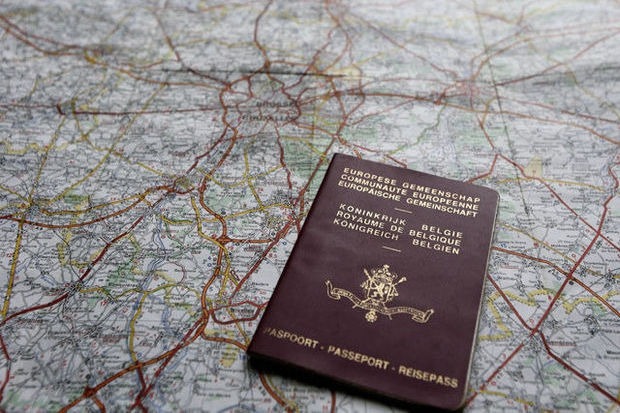I became Belgian last month. By accident.
OK, it wasn’t totally by chance. I applied for Belgian nationality in July, filled in a handful of forms, paid about €50 and wasn’t invited for an interview or language test.
I was also pretty confident my application would be successful. After all, I have a house and company here, my kids were born and go to school here and I’ve always paid taxes and social security here.
But this was never meant to happen.
I arrived in Brussels almost 26 years ago to do a 5-month internship. I’ve been trying to leave ever since. Unsuccessfully.
“Despite my Belgian ID card and driver’s license, I do not feel even 1 percent ‘Belge,’ I wrote in an article on European identity eight years ago. “Marmite, marmalade, cricket, warm beer, snooker, darts, embarrassed silences, sodden moors, slow trains, pasty faces — that is Britain. That I can relate to. That made me who I am. Ostend beach, snails, eels, King Albert II, lace curtains, kissing men’s cheeks, garden gnomes, 55 percent taxation, racing pigeons, gingerbread biscuits — that is Belgium. That I can’t relate to.”
In retrospect I realise this list is arbitrary – I can’t relate to British garden gnomes either and cricket and warm beer were never really part of my culture. But the truth is I’ve lived most of the past quarter of a century in this country in spite of Belgium, not because of it. I read British and American papers, not Le Soir or De Standaard. I watch the BBC, not RTBF or VRT. And although I speak fluent French, the only Dutch I know is from helping with my kids’ homework.
So why did I apply for Belgian nationality if I’m seemingly so attached to my homeland and so ambivalent about my adopted country?
Brexit was obviously the spur. With Britain’s future relationship with the EU so uncertain I didn’t want to risk everything I’ve built in Belgium – my house, company, pension, family and friends.
I also feel fewer and fewer bonds with Britain, which deprived me of my right to vote after 15 years living outside the country and has now deprived me of my right to live, work and move freely in the European Union.
Increasingly, when I visit Britain, I feel like a tourist in the land of my birth.
In London, I’m surprised that you can’t go round in a circle on the Circle Line anymore and that everybody I speak to in pubs, hotels and restaurants is from continental Europe.
In the village in Wales where I was born and my parents still live, I try to pay for toiletries but am told they no longer accept the old, non-polymer bank note I hand over. “Sorry, I’m from Belgium,” I mutter apologetically.
In the quintessential English town in Devon where my brother and family lives, I take pictures of red post boxes, a pink-faced butcher slicing sausages in his stripy apron and a country gent easing his buttocks into his vintage Bentley. It feels like a Playmobil version of an England that is slowly dying out.
And before leaving the country, I stock up on Scotch eggs, shortbread, pork pies, scones and clotted cream, prawn cocktail crisps, Liquorice Allsorts and other goodies to bring back to Belgium.
But when I get back to Brussels and start unpacking all the sweet and salty treats, I realise that – for better or worse – this is home now. It’s where I learned to drive, got my Master’s, met my partner, had my kids, bought my first house and spent almost all my working life.
But it’s more than that. Belgium is a chaotic, frustrating country that’s easy to moan about but difficult to beat. Unlike its neighbours to the south and west it’s neither arrogant nor haughty. It’s one of the best places in the world to eat, drink and read comic strips. Its cities – in particular Antwerp, Gent and pockets of Brussels – are gems. And its people don’t take themselves or their country too seriously - its most famous monument is of a small boy peeing. After 26 years it may no longer excite but it still intrigues.
I used to think that nationality was like family – something you don’t choose and can’t shrug off. I now realise that it’s not so deterministic; that identity is not binary but can involve multiple, overlapping layers. It is possible to like Marmite and eels – although preferably not together.
I’m now Belgian and British – which means I cheer for Wales in rugby, Belgium in football – unless it’s against Wales of course – Team GB in the Olympics and Europe in the Ryder Cup golf tournament against the United States. No contradictions there.
It means I still love a good fry up and a Sunday roast when I’m back in Britain, but am more excited these days by grey prawn croquettes and beef slow-cooked in beer, washed down with a creamy Leffe or Chouffe ale.
It means that while I rage against cars parked on pavements – when I complained to neighbours they told me to ‘stop being so British’ – I’ll happily drive down one-way streets, burn red lights and speed through city streets as adeptly as any of my new compatriots.
What it doesn’t mean is airbrushing your past or abandoning your heritage. In that respect, changing nationality is like replanting a tree – if you’re careful with the roots there’s no reason it shouldn’t thrive in a different place.
In the two years after Britain voted to leave the EU in June 2016, my partner and friends begged me to apply for Belgian nationality. I resisted, arguing it would be perverse to become a citizen of a country I was desperate to quit and many of its own people would prefer to dismember. In the summer of 2018, I finally submitted my application – but still more out of administrative necessity than cultural affinity.
But when a letter arrived from my local commune announcing my demand for Belgian nationality had been accepted, I felt a strange sense of pride. I realised that Belgium has always treated my family and I well and that if the feeling was not always reciprocated it was more because of my issues than my host country’s. I realised that I loved this country like you love a drunken aunt or garrulous uncle – out of deep bonds forged by habit. And I realised that, despite my stubborn resistance, I was slowly becoming Belgian.
So that evening, with my family and a couple of friends, we had a Belgian dinner to celebrate my new nationality. My kids painted my face in the red, black and yellow of the Belgian flag and kitted me out in assorted Red Devils paraphernalia. We ate steak and thick-cut fries with lashings of mayonnaise and vanilla ice cream drizzled with melted chocolate. We drank lots of unfeasibly strong beer made by monks. And we blasted out ‘Potverdekke – it’s great to be a Belgian’ – a satirical song that was biggish in Brussels in 2003:
As I walk along the street, with my mayonnaise and frites,
You can tell I'm as happy as can be.
With my Duvel in my hand then you must understand,
I'm a Belgian so nothing worries me!


